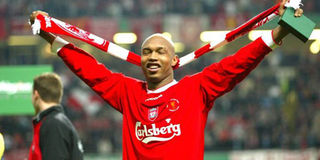Diouf, the Senegal king Liverpool shouldn’t have signed

El-Hadji Diouf. FILE PHOTO
What you need to know:
- At the 2019 Nations Cup in Cairo, Diouf told the media that he wished Sadio Mane to win the Afcon and “be even better than me.”
By this time in 2002, Salif Diao and El-Hadji Diouf were packing their bags heading for Liverpool after crashing out of the World Cup quarterfinals against Turkey.
Substitute İlhan Mansız had scored the golden goal in 94 minutes to end the Cinderlla run of Bruno Metsu’s men in the Far East. The Teranga Lions were crestfallen but they had duly advertised their talent at the world expo.
Senegal had left Korea-Japan 2002 as giant killers, thanks mostly to their deserved conquest of European and world champions France. Draws against Denmark and Uruguay saw them into the Second Round and another deserved win over Zlatan Ibrahimovic’s Sweden propelled them to the last eight. Cameroon, in 1990, had been the only African side to reach that far.
The hugely marketed Senegalese stars, most of whom played in France then, got offers. Captain Aliou Cissé signed for Birmingham in the Premier League. Defender Ferdinand Coly followed him on loan.
Henri Camara, who scored a brace against Sweden, would leave Sedan after its relegation to the French Ligue 2, for Wolverhampton Wanderers, who had been promoted to the topflight.
However, Liverpool had signed Diao and Diouf for a combined £15m before the World Cup. The duo had been instrumental in Senegal’s 2002 African Cup of Nations campaign, where they lost the final in a shootout against Cameroon.
Named in the 2002 Fifa All-Star team, Diouf was expected to outperform Titi Camara and Rigobert Song – who preceded him at Anfield.
Wrong attitude
Diouf showed promise when he scored a brace in Liverpool’s 3-0 win over Southampton on August 24 at Anfield. But he did not score again until March 2003. During the drought, though, he was carving a reputation of controversy, which defined his three years at Liverpool.
The worst moment was that night in a 1-1 draw with Celtic in the Uefa Cup in 2003. Days before, Diouf had scored and assisted in a 2-0 win over Bolton in the Premier League. The Kop expected more glory. But he delivered what he had most in stock – shame.
Diouf spat a phlegm at a Celtic fan at Celtic Park. Liverpool fined him £60,000, which was donated to a charity of Celtic’s choice.
Coach Gerard Houllier had no kind words for the impudent striker: “The stigma of what you did will follow you round for the rest of your career. You’ll never live it down.”
As if Houllier had cast a spell on Diouf, he did not score again that season and in the season (2003/04) that followed.
Liverpool vice captain Jamie Carragher summed it up: “He has one of the worst strike
rates of any forward in Liverpool history. He’s the only No. 9 ever to go through a whole season without scoring, in fact he’s probably the only No. 9 of any club to do that. He was always the last one to get picked in training.”
In his first autobiography published in 2007, Steven Gerrard called Diouf a lazy and self-interested character. “His attitude was all wrong.”
In his book, Carragher was more radical: “Diouf seemed to care less about winning or losing.”
Carragher retold the story of Liverpool’s FA Cup defeat to Portsmouth in 2004. The following day, Michael Owen, who had missed a penalty, was inconsolable at Melwood. But Diouf drove in with music blaring from his car and “danced across the car park.”
“You’d think we had won the Cup. His attitude disgusted me,” Carragher wrote.
Verbal artillery To borrow Gerrard’s words, the Senegalese could have had no real interest in football but he never tolerates condemnation. In 2012, Diouf called Gerrard “jealous.”
“He hasn’t achieved what I have done in football. When I came to Liverpool, I came up with the status of boss,” he said.
“I am respected in world football, the greatest football experts have named me among the seven best players in the World Cup, the top 100 players of the century.
“I am Mr El-Hadji Diouf, Mr Senegal but he is Mr Liverpool and Senegal is bigger than Liverpool.”
The exchanges between Diouf and Gerrard are like Israel-Palestine battles. In another book, My Story, published in 2015, Gerrard said: “I don’t really want to waste time thinking about Diouf but it’s worth highlighting his wasted seasons at Liverpool as an example of how it can all go wrong.”
Diouf fired back, calling Gerrard a racist who “has never liked black people.”
“I can say today that the shirt that I regret wearing the most was Liverpool’s,” Diouf told RMC Sport. “Because if I were to do that part of my career again, I would have gone to Barcelona or Man United. At the time, they wanted me too.”
At the 2019 Nations Cup in Cairo, Diouf told the media that he wished Sadio Mane to win the Afcon and “be even better than me.”
Mane led Senegal to the final but, like Diouf in 2002, lost to Algeria. However, at club level, Mane won the Champions League in 2018/19 and is a mainstay in Jurgen Klopp’s team that sealed the Premier League title on Thursdayy.
With 80 league goals and 29 assists in 186 matches, the African Footballer of the Year is targeted by Real Madrid and Barcelona. Diouf’s exit from Anfield – after three goals in 62 games – was a loan deal to mid-table Bolton.
If Barcelona and Man United courted him in 2002, certainly none regret missing out on him.




